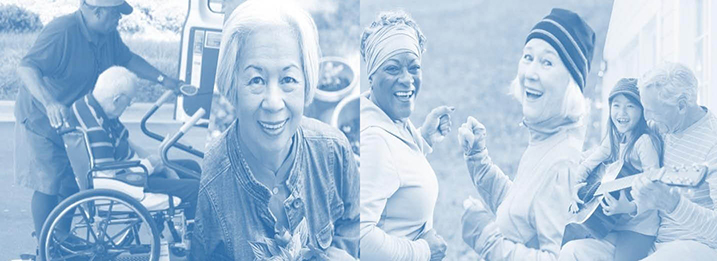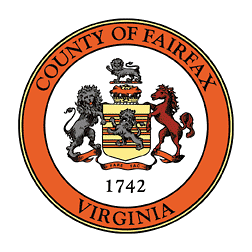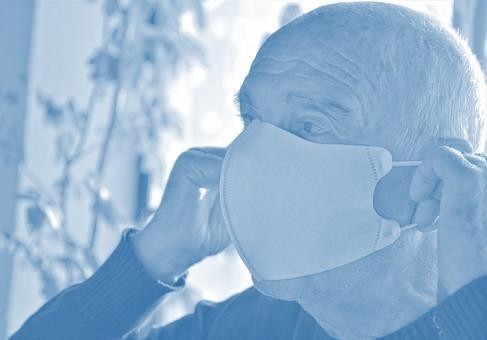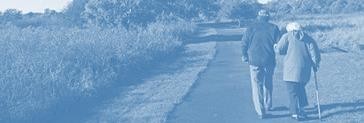
Department of Family Services Alert:



Dear Fairfax County residents,
No demographic has been harder hit by the pandemic than our older adult community. Case rates and fatality rates among older adults are the highest. Through June roughly 75 percent of COVID deaths in Fairfax County were from long term care facilities that serve our older adults. To date, over 80 percent of COVID deaths in Fairfax County have been adults 65 and older and over 95 percent of all deaths have been adults 50 and older. For those older adults who have not contracted the virus, the pandemic has exacerbated the challenges they were already facing, including physical and mental health issues including isolation. This is a tragedy that cannot go unaddressed.
As a result of the pandemic, many of the County’s older adults have been living in virtual isolation and fear. Visits from friends, families and caregivers have been reduced or eliminated. The volunteer and other activities older adults regularly participate in have been closed or severely cut back. Many of our older adults are living in isolation due to COVID restrictions and fear of the disease. It is likely that the impact will continue for some time.
In July, we asked the Board of Supervisors to pause the development of the SHAPE the Future of Aging Plan that was approved for this year and focus on a plan to address the critical issues facing our older adults during the pandemic. After multiple workgroups and focus groups with our Fairfax Area Commission on Aging, 50+ Community Ambassadors, village coordinators, the Health Department as well as medical and mental health professionals from Inova, County staff, nonprofit partners, and community members, we have synthesized their needs and feedback in this plan. The three primary needs they identified for older adults are wellness, technology, and social isolation. With their input, we have developed short term initiatives to better serve our older adult community through the remainder of the pandemic. It also includes a focus on what older adults can and should be doing in order to maintain their mental and physical health.
In addition to these initiatives, this plan includes a comprehensive list of the continued services that county staff and partners are offering. Specifically the lead agency: the Department of Family Services’ Fairfax Area Agency on Aging, as well as the Department of Neighborhood and Community Services, the Fairfax County Health Department, the Fairfax-Falls Church Community Services Board, Fairfax County Department of Fire and Rescue, the Department of Housing and Community Development, and ServiceSource have executed providing services, supports and advocacy since the beginning of the pandemic.
To our staff, Fairfax Area Commission on Aging, and partners, thank you for your dedication and passion for serving our most vulnerable. Your service to our community during this difficult time has been and continues to be invaluable.
To our caregivers, the care you provide everyday for our older adults, even as you struggle to care for your own family does not go unnoticed. Without you, we could not care for our older population, thank you.
And to our residents, especially our older adults, thank you for not giving up on each other during these difficult times. We all need one another.
Our hope is that through these strategic initiatives, as well as the many continued efforts of our staff, we can care for our most vulnerable population in this pandemic and continue our mission to help them age with dignity.
Sincerely,
Supervisor Pat Herrity Springfield District Supervisor
Chairman of the Older Adults Committee
Supervisor James Walkinshaw Braddock District Supervisor
Vice Chairman of the Older Adults Committee
 COVID-19 has impacted communities around the world. The oldest members of these communities have been hit especially hard. Fairfax County staff and partners have been working collaboratively across agencies to continuously gather information on the needs of marginalized communities and to address both existing and new needs of older adults.
COVID-19 has impacted communities around the world. The oldest members of these communities have been hit especially hard. Fairfax County staff and partners have been working collaboratively across agencies to continuously gather information on the needs of marginalized communities and to address both existing and new needs of older adults.
On July 28, 2020, at a Fairfax County Board of Supervisors meeting, Supervisor Pat Herrity and Supervisor James Walkinshaw introduced a Board Matter that recognized some of the specific challenges facing older adults. The Supervisors jointly called for a COVID-19 Response Plan for Older Adults that would offer insights and provide resources to older adults in addressing some of those challenges.
It identified three primary concerns:
This COVID-19 Response Plan reflects:
This plan references older adults but intentionally includes programs and services for caregivers and adults 18 and older with disabilities. The Fairfax Area Agency on Aging (AAA) is part of the Adult and Aging Division in the Department of Family Services (DFS).
In September, the COVID-19 Response Plan workgroup conducted two focus groups: one for 50+ Ambassadors and representatives of the Neighbor to Neighbor village network, and one for medical and mental health providers. The purpose was to gather feedback from professionals and experienced volunteers familiar with older adults who do and do not have access to technology.
The focus groups were intended to capture feedback from diverse, marginalized, and other communities regarding gaps in services and on what potential solutions they might suggest for the challenges related to social isolation, technology, and physical, emotional and mental wellness.
Facilitated by county staff, and members of the Fairfax Area Commission on Aging (COA), the focus groups used surveys and dialogue to document insight on where the county should focus next efforts in increasing support to older adults during the pandemic and beyond.
The complexities of COVID-19 have created a need for both physical and social distancing. This distancing has impacted the daily routines and activities of all people, but especially of older adults. In Fairfax County, restricted visitation at long-term care (LTC) facilities, closure of congregate sites for activities, modified volunteer services, and contactless Meals on Wheels services have profoundly impacted interactions within the older adult community and contributes to social isolation.
In August, ADvancing States, an organization that represents the nation’s 56 state and territorial Agencies on Aging and long-term services and supports, released Addressing Social Isolation for Older Adults During the COVID-19 Crisis. This resource states that “loneliness and social isolation for older adults have a deep emotional impact, sometimes leading to social disorders such as depression and anxiety. Maybe less well-known is the profound impact loneliness has on physical
health.” We note with pride that Fairfax County’s Virtual Center for Active Adults was recognized in this report for its partnership between county agencies and a nonprofit to produce the Lunch Bunch series to help provide virtual social opportunities for seniors.
Fairfax County has collaborated across agencies to ensure that there are services in place for residents of the county, as well as the cities of Fairfax and Falls Church, that address the risk of increased social isolation for older adults. Some of those services include:
In January 2019, an article published by AARP, Older Americans’ Technology Usage Keeps Climbing, stated that “91% of those age 50+ report using a computer, and 94% say technology helps them keep in touch with family and friends.” Yet despite these promising statistics on use of technology, older adults who do not have the means or capability to purchase and use technology or access the internet must not be forgotten.
COVID-19 brought about rapid and dramatic changes in the way older adults, as well as others, interact. Technology is at the center of those changes, bringing challenges but also some significant benefits. Many older adults have turned to technology to avoid social isolation and to address wellness in the COVID-19 environment. Technology allows families and friends to engage even while maintaining a safe physical distance.
The Administration for Community Living (ACL) and the Office of the Assistant Secretary for Health launched a Mental Health Innovation Challenge to combat social isolation. It will provide awards up to $750,000 for development of an easy-to- use online system that offers suggestions for programs, activities, technologies and resources that can help people connect to others and engage in the community, based on their individual needs, interests and abilities. No Wrong Door Virginia is one of two finalists in the competition. The technology helps people create their own social connection plan based on assessment and aggregated information from personalized answers, options, and resources, and if awarded will benefit older adults and caregivers across the nation.
Locally, here are some of the ways that Fairfax County teams have banded together to ensure that older adults have technology-based options to enhance their wellbeing:
COVID-19 has brought change to daily routines for most people. For older adults, the impact has been profound. As the Centers for Disease Control and Prevention (CDC) acknowledges in a July 1, 2020 release, Coping with Stress, “Public health actions, such as social distancing, can make people feel isolated and lonely and can increase stress and anxiety.” But since these actions are necessary to combat the virus, the CDC advises that, “coping with stress in a healthy way will make you, the people you care about, and your community stronger.”
Resilience is key, and part of resilience is paying attention to physical, emotional, and mental wellness. Across Fairfax County agencies that care for the community, teams recognize the importance of wellness. Here are some services offered to help residents care for themselves:

In addition to the short-term solutions that will be explored, additional feedback was received in response to COVID-19 that will be considered in the development of next steps for the SHAPE the Future of Aging Plan.
This report, compiled by the COVID-19 workgroup and the Commission on Aging, highlights the collaboration and partnership among departments and community. The report emphasizes the many services Fairfax County has implemented during these unprecedented times with the help of strong collaborators and a lens on equity to address marginalized communities. It also points to ways where increased data informed decisions could lead to doing more to keep all our older residents healthy, connected, and informed—both now, and in the future.
In researching and addressing three pandemic highlighted topics: social isolation, technology, and wellness; the COVID-19 workgroup and Commission on Aging will enact this plan by further investigating initiatives that were outlined as common themes in the Focus Group Input section. As resources and collaborative efforts move initiatives forward, understandably, this work and current work will inform and lay the groundwork for the longer-term SHAPE the Future of Aging plan, which will comprise an even more comprehensive approach to future planning that will support older adults, adults with disabilities, and their caregivers.
For more information about any of the programs listed contact:
The Department of Family Services’ Aging, Disability, and Caregiver Resource Line (ADCR) at 703-324-7948, TTY 711. Staffed
by social service specialist, the ADCR is a trusted source of information that older adults, adults with disabilities, and their caregivers can use to obtain assistance in planning for their needs. Information and referrals to resources are provided according to each caller’s unique circumstances. ADCR hours are Monday through Friday, 8 a.m. – 4:30 p.m. They can also be reached by filling out a web request form.
To report abuse, neglect or exploitation call Adult Protective Services at 703-324-7450, TTY 711.
COVID-19 specific information can be found on the Fairfax County Health Department website.
To stay informed about interesting topics and resources for older adults and caregivers – subscribe to the Golden Gazette.

Plan Sponsors
Board of Supervisors Staff
Fairfax Area Commission on Aging
Fairfax–Falls Church Community Services Board
Fairfax County Department of Family Services
Fairfax County Department of Fire and Rescue
Fairfax County Department of Housing and Community Development
Fairfax County Department of Neighborhood and Community Services
Fairfax County Health Department
Fairfax County Office of Strategy Management
Fairfax County’s Collaborative Response to Address Social Isolation, Technology, and Wellness Needs for Older Adults and Their Caregivers Through COVID-19
COVID-19 Response Plan for Older Adults: Immediate Initiatives to Move Forward
Social Isolation
Technology
Wellness

Check out this one-minute video about our COVID response.
Steps to Slow the Spread of COVID-19
In April 2020, Fairfax County Health Department distributed important information, “Steps to Slow the Spread of COVID-19*,” to all residents in Fairfax County and the cities of Fairfax and Falls Church.
Assistance from a Distance
In June 2020, Health and Human Services agencies created a Countywide “Assistance from a Distance*” mailer that has been distributed to 450,000 households in Fairfax County. The mailer includes content in English and Spanish and provides an overview of how residents can access key services including child care, food and health care assistance, housing, mental health, transportation and more during the COVID-19 pandemic.
*Fairfax County is committed to nondiscrimination on the basis of disability in all county programs, services and activities. To receive this information in an alternate format, call 703-324-7500 or TTY 711.
